- Home
- Anne Lamott
Plan B
Plan B Read online
THE BERKLEY PUBLISHING GROUP
Published by the Penguin Group
Penguin Group (USA) Inc.
375 Hudson Street, New York, New York 10014, USA
Penguin Group (Canada), 90 Eglinton Avenue East, Suite 700, Toronto, Ontario M4P 2Y3, Canada (a division of Pearson Penguin Canada Inc.)
Penguin Books Ltd., 80 Strand, London WC2R 0RL, England
Penguin Group Ireland, 25 St. Stephen’s Green, Dublin 2, Ireland (a division of Penguin Books Ltd.)
Penguin Group (Australia), 250 Camberwell Road, Camberwell, Victoria 3124, Australia (a division of Pearson Australia Group Pty. Ltd.)
Penguin Books India Pvt. Ltd., 11 Community Centre, Panchsheel Park, New Delhi—110 017, India
Penguin Group (NZ), cnr Airborne and Rosedale Roads, Albany, Auckland 1310, New Zealand (a division of Pearson New Zealand Ltd.)
Penguin Books (South Africa) (Pty.) Ltd., 24 Sturdee Avenue, Rosebank, Johannesburg 2196, South Africa
Penguin Books Ltd., Registered Offices: 80 Strand, London WC2R 0RL, England
Copyright © 2005 by Anne Lamott
Cover photograph of hymn board © 2004 by Joshua Sheldon
Book design by Stephanie Huntwork
The author gratefully acknowledges permission to reprint:
“Monet Refuses the Operation” by Lisel Mueller, from Alive Together: New and Selected Poems.
Copyright 1996 by Lisel Mueller. Reprinted by permission of Louisiana State University Press. Lines from “Annunciation” by Denise Levertov, from A Door in the Hive. Copyright 1989 by Denise Levertov.
Reprinted by permission of New Directions Publishing Corp.
All rights reserved.
No part of this book may be reproduced, scanned, or distributed in any printed or electronic form without permission. Please do not participate in or encourage piracy of copyrighted materials in violation of the author’s rights. Purchase only authorized editions.
RIVERHEAD is a registered trademark of Penguin Group (USA) Inc.
The RIVERHEAD logo is a trademark of Penguin Group (USA) Inc.
First Riverhead hardcover edition: March 2005
First Riverhead trade paperback edition: April 2006
First Riverhead ebook edition: March 2006
ISBN 978-1-1012-1736-8
Making or distributing electronic copies of this book constitutes copyright infringement and could subject the infringer to criminal and civil liability.
Contents
monet refuses the operation
one ham of god
two red cords
three sam’s dad
four o noraht, noraht
five holy of holies 101
six this dog’s life
seven adolescence
eight sincere meditations
nine heat
ten hard rain
eleven good friday world
twelve diamond heart
thirteen untitled
fourteen ’joice to the world
fifteen holding on
sixteen one hand clapping
seventeen loving your president: day 2
eighteen scattering the present
nineteen flower girl
twenty sam’s brother
twenty-one falling better
twenty-two cruise ship
twenty-three let us commence
twenty-four market street
also by anne lamott
Blue Shoe
Traveling Mercies
Crooked Little Heart
Bird by Bird
Operating Instructions
All New People
Joe Jones
Rosie
Hard Laughter
For Rory
I am deeply grateful to David Talbot, editor in chief of Salon.com, who published much of this material in earlier form. I am just about the only overtly spiritual person he can stand, but even so he has always given me absolute freedom and unwavering support. Lori Leibovich, my editor at Salon, has shown me total patience, friendship, and great editing.
My friends are the reason I have so much faith in God, and I owe special thanks to the people who help me with my work: Neshama Franklin, Tom Weston, Mark Childress, Geneen Roth, Doug Foster, and Anne Huffington. And thank you, Karl Fleming, for your faith in me, and your letters saying so. I tape them to the wall beside my desk. Robyn Posin, where would I be without you?
Cindy Spiegel at Riverhead is a great, challenging editor and friend. Anna Jardine is a tough, cool, reputation-saving copy editor.
I would be grateful even to know someone who is as both loving and savvy as Sarah Chalfant, and here she’s my agent— along with the incomparable Andrew Wylie.
And I would not be here were it not for the love, support, and wisdom of the people of St. Andrew Presbyterian Church, Marin City, California, and the Reverend Ms. Veronica Goines. Their deep faith and love of God, and life, have changed my world forever: they taught me by their witness that no matter how hard life seems at times, we can still—in the words of Warren Zevon—enjoy every sandwich; and give thanks.
monet refuses the operation
Doctor, you say there are no halos
around the streetlights in Paris
and what I see is an aberration
caused by old age, an affliction.
I tell you it has taken me all my life
to arrive at the vision of gas lamps as angels,
to soften and blur and finally banish
the edges you regret I don’t see,
to learn that the line I called the horizon
does not exist and sky and water,
so long apart, are the same state of being.
Fifty-four years before I could see
Rouen cathedral is built
of parallel shafts of sun,
and now you want to restore
my youthful errors: fixed
notions of top and bottom,
the illusion of three-dimensional space,
wisteria separate
from the bridge it covers.
What can I say to convince you
the Houses of Parliament dissolve
night after night to become
the fluid dream of the Thames?
I will not return to a universe
of objects that don’t know each other,
as if islands were not the lost children
of one great continent. The world
is flux, and light becomes what it touches,
becomes water, lilies on water,
above and below water,
becomes lilac and mauve and yellow
and white and cerulean lamps,
small fists passing sunlight
so quickly to one another
that it would take long, streaming hair
inside my brush to catch it.
To paint the speed of light!
Our weighted shapes, these verticals,
burn to mix with air
and change our bones, skin, clothes
to gases. Doctor,
if only you could see
how heaven pulls earth into its arms
and how infinitely the heart expands
to claim this world, blue vapor without end.
—LISEL MUELLER
one
ham of god
On my forty-ninth birthday, I decided that all of life was hopeless, and I would eat myself to death. These are desert days. Better to go out by our own hands than to endure slow death by scolding at the hands of the Bush administration. However, after a second cup of coffee, I realized that I couldn’t kill myself that morning—not because it was my birthday but because I’d promised to get arrested the next day. I had been arrested three weeks earlier with an ecumenica
l bunch of religious peaceniks, people who still believe in Dr. King and Gandhi. Also, my back was out. I didn’t want to die in crone mode. Plus, there was no food in the house. So I took a long, hot shower instead and began another day of being gloated to death.
Everyone I know has been devastated by Bush’s presidency and, in particular, our country’s heroic military activities overseas. I can usually manage a crabby hope that there is meaning in mess and pain, that more will be revealed, and that truth and beauty will somehow win out in the end. But I’d been struggling as my birthday approached. So much had been stolen from us by Bush, from the very beginning of his reign, and especially since he went to war in Iraq. I wake up some mornings pinned to the bed by centrifugal sadness and frustration. A friend called to wish me Happy Birthday, and I remembered something she’d said many years ago, while reading a Vanity Fair article about Hitler’s affair with his niece. “I have had it with Hitler,” Peggy said vehemently, throwing the magazine to the floor. And I’d had it with Bush.
Hadn’t the men in the White House ever heard of the word karma? They lied their way into taking our country to war, crossing another country’s borders with ferocious military might, trying to impose our form of government on a sovereign nation, without any international agreement or legal justification, and set about killing the desperately poor on behalf of the obscenely rich. Then we’re instructed, like naughty teenagers, to refrain from saying that it was an immoral war that set a disastrous precedent—because to do so is to offer aid and comfort to the enemy.
While I was thinking about all this, my Jesuit friend Father Tom called. He is one of my closest friends, a few years older than I, a scruffy aging Birkenstock type, like me, who gives lectures and leads retreats on spirituality. Usually he calls to report on the latest rumors of my mental deterioration, drunkenness, or promiscuity, how sick it makes everyone to know that I am showing all my lady parts to the neighbors. But this time he called to wish me Happy Birthday.
“How are we going to get through this craziness?” I asked. There was silence for a moment.
“Left foot, right foot, left foot, breathe,” he said.
Father Tom loves the desert. A number of my friends do. They love the skies that pull you into infinity, like the ocean. They love the silence, and how, if you listen long enough, the pulse of the desert begins to sound like the noise your finger makes when you run it around the rim of a crystal glass. They love the scary beauty—snakes, lizards, scorpions, the kestrels and hawks. They love the mosaics of water-washed pebbles on the desert floor, small rocks that cast huge shadows, a shoot of vegetation here, a wildflower there.
I like the desert for short periods of time, from inside a car, with the windows rolled up and the doors locked. I prefer beach resorts with room service. But liberals have been in the desert for several years now, and I’m worn out. Some days I hardly know what to pray for. Peace? Well, whatever.
So the morning of my birthday, because I couldn’t pray, I did what Matisse once said to do: “I don’t know if I believe in God or not. . . . But the essential thing is to put oneself in a frame of mind which is close to that of prayer.” I closed my eyes, and got quiet. I tried to look like Mother Mary, with dreadlocks and a bad back.
But within seconds, I was frantic to turn on the TV. I was in withdrawal—I needed more scolding from Donald Rumsfeld, and more malignant celebration of what everyone agreed, in April 2003, was a great victory for George W. Bush. So we couldn’t find those stupid weapons of mass destruction—pick, pick, pick. I didn’t turn on the TV. I kept my eyes closed, and breathed. I started to feel crazy, and knew that all I needed was five minutes of CNN. I listened to the birds sing outside, and it was like Chinese water torture, which I am sure we don’t say anymore. Then I remembered the weekend when 11 million people in the world marched for peace, how joyful it was to be part of the stirrings of a great movement. My pastor, Veronica, says that peace is joy at rest, and joy is peace on its feet, and I felt both that weekend.
I lay on the floor with my eyes closed for so long that my dog, Lily, came over and worriedly licked me back to life. That cheered me up. “What did you get me for my birthday?” I asked. She started to chew on my head. That helped. Maybe the old left is dead, but after we’ve rested awhile we can prepare for something new. I don’t know who on the left can lead us away from the craziness and barbarity: I’m very confused now. But I know that in the desert, you stay out of the blistering sun. You go out during the early morning, and in the cool of the evening. You seek oasis, shade, safety, refreshment. There’s every hue of green, and of gold. But I’m only pretending to think it’s beautiful; I find it terribly scary. I walk on eggshells, and hold my breath.
I called Tom back.
He listened quietly. I asked him for some good news.
He thought. “Well,” he said finally. “My cactuses are blooming. Last week they were ugly and reptilian, and now they are bursting with red and pink blossoms. They don’t bloom every year, so you have to love them while they’re here.”
“I hate cactuses,” I said. “I want to know what to do. Where we even start.”
“We start by being kind to ourselves. We breathe, we eat. We remember that God is present wherever people suffer. God’s here with us when we’re miserable, and God is there in Iraq. The suffering of innocent people draws God close to them. Kids hit by U.S. bombs are not abandoned by God.”
“Well, it sure looks like they were,” I said. “It sure looks that way to their parents.”
“It also looked like Christ had been abandoned on the cross. It looked like a win for the Romans.”
“How do we help? How do we not lose our minds?”
“You take care of the suffering.”
“I can’t get to Iraq.”
“There are folks who are miserable here.”
After we got off the phone, I ate a few birthday chocolates. Then I asked God to help me be helpful. It was the first time that day that I felt my prayers were sent, and then received—like e-mail. I tried to cooperate with grace, which is to say, I did not turn on the TV. I asked God to help me again. The problem with God—or at any rate, one of the top five most annoying things about God—is that He or She rarely answers right away. It can take days, weeks. Some people seem to understand this—that life and change take time. Chou En-lai, when asked, “What do you think of the French Revolution?” paused for a minute—smoking incessantly—then replied, “Too soon to tell.” I, on the other hand, am an instant-message type. It took decades for Bush to destroy the Iraqi army in three weeks.
But I prayed: Help me. And then I drove to the market in silence, to buy my birthday dinner.
I flirted with everyone in the store, especially the old people, and I lightened up. When the checker finished ringing up my items, she looked at my receipt and cried, “Hey! You’ve won a ham!”
I felt blindsided by the news. I had asked for help, not a ham. This was very disturbing. What on earth was I going to do with ten pounds of salty pink eraser? I rarely eat it. It makes you bloat.
“Wow,” I said. The checker was so excited about giving it to me that I pretended I was, too.
How great!
A bagger was dispatched to the back of the store to fetch my ham. I stood waiting anxiously. I wanted to go home, so I could start caring for suffering people, or turn on CNN. I almost suggested that the checker award the ham to the next family who paid with food stamps. But for some reason, I waited. If God was giving me a ham, I’d be crazy not to receive it. Maybe it was the ham of God, who takes away the sins of the world.
I waited ten minutes for what I began to think of as “that fucking ham.” Finally the bag boy handed me a parcel the size of a cat. I put it with feigned cheer into my grocery cart, and walked to the car, trying to figure out who might need it. I thought about chucking the parcel out the window near a field. I was so distracted that I crashed my cart smack into a slow-moving car in the parking lot.
I start
ed to apologize, when I noticed that the car was a rusty wreck, and that an old friend was at the wheel. We got sober together a long time ago, and each of us had a son at the same time. She has dark black skin and processed hair the color of cooled tar.
She opened her window. “Hey,” I said. “How are you—it’s my birthday!”
“Happy Birthday,” she said, and started crying. She looked drained and pinched, and after a moment, she pointed to her gas gauge. “I don’t have money for gas, or food. I’ve never asked for help from a friend since I got sober, but I’m asking you to help me.”
“I’ve got money,” I said.
“No, no, I just need gas,” she said. “I’ve never asked someone for a handout.”
“It’s not a handout,” I told her. “It’s my birthday present.” I thrust a bunch of money into her hand, everything I had. Then I reached into my shopping cart and held out the ham to her like a clown offering flowers. “Hey!” I said. “Do you and your kids like ham?”
“We love it,” she said. “We love it for every meal.”
She put it in the seat beside her, firmly, lovingly, as if she were about to strap it in. And she cried some more.
Later, thinking about her, I remembered the seasonal showers in the desert, how potholes in the rocks fill up with rain. When you look later, there are already frogs in the water, and brine shrimp reproducing, like commas doing the macarena; and it seems, but only seems, that you went from parched to overflow in the blink of an eye.
two
red cords
I wear something on my wrist that one would not expect a Presbyterian woman to wear: a thin red cotton cord that was blessed by the Dalai Lama, and given to me by my Buddhist friend Jack Kornfield. It’s quite ratty, with what look like rings of laundry lint circling it. I separate these rings with my thumbnail when I am fidgety, as if counting with the beads of an abacus.
Jack and I take walks every few weeks, when we are both in town, often in the hills above the meditation center he founded nearby. He teaches his students, and has taught me, to slow down, breathe, and take care of everyone, which is of course the same message Jesus taught—that breath is our connection to holy spirit, to our bodies, minds, and soul; and that if the devil can’t get you to sin, he’ll keep you busy. Jack is about my age and height, slight and very Jewish: he brought me homemade chicken soup last time I was sick in bed. He also seems vaguely East Indian, smooth and brown, and gives off a light, spicy, ancient smell.

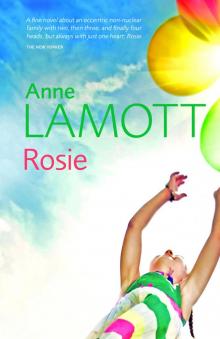 Rosie
Rosie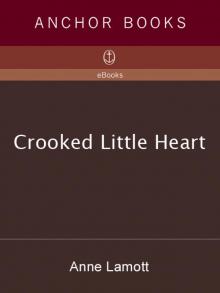 Crooked Little Heart
Crooked Little Heart Bird by Bird: Some Instructions on Writing and Life
Bird by Bird: Some Instructions on Writing and Life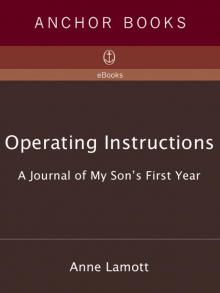 Operating Instructions: A Journal of My Son's First Year
Operating Instructions: A Journal of My Son's First Year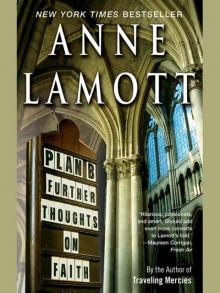 Plan B: Further Thoughts on Faith
Plan B: Further Thoughts on Faith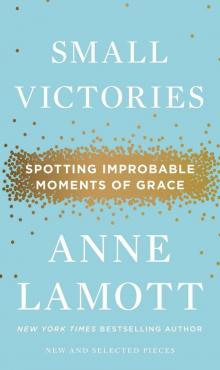 Small Victories: Spotting Improbable Moments of Grace
Small Victories: Spotting Improbable Moments of Grace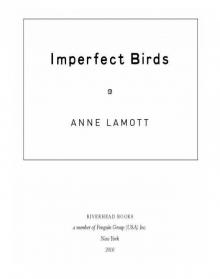 Imperfect Birds
Imperfect Birds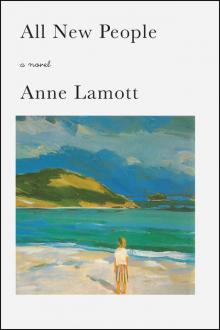 All New People
All New People Grace (Eventually)
Grace (Eventually)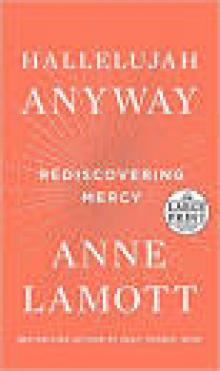 Hallelujah Anyway
Hallelujah Anyway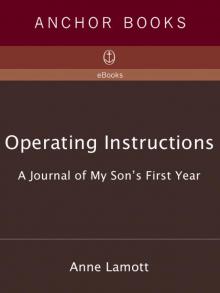 Operating Instructions
Operating Instructions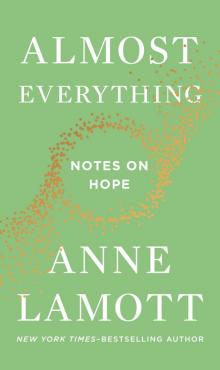 Almost Everything
Almost Everything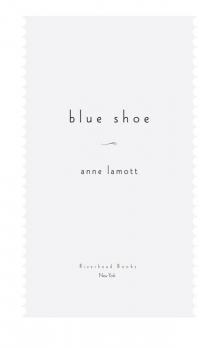 Blue Shoe
Blue Shoe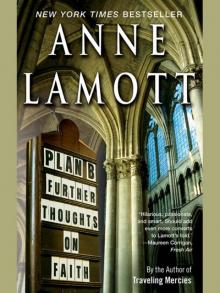 Plan B
Plan B Bird by Bird
Bird by Bird